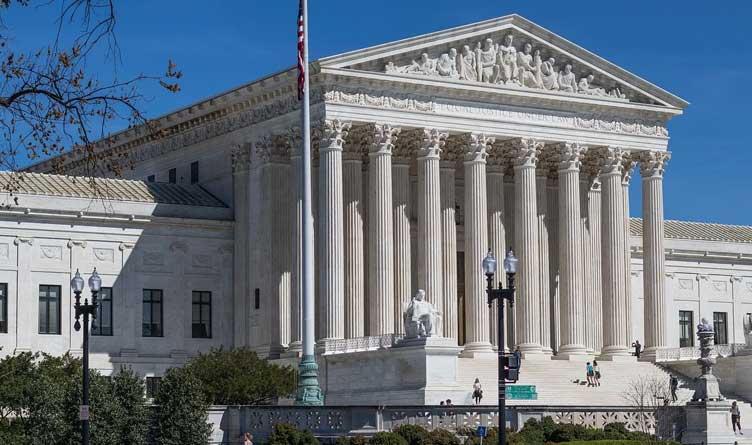Arizona Attorney General Mark Brnovich Made The State’s Case Tuesday For Maintaining A Couple Of Election Integrity Issues That, If Deemed Illegal, Could Change Election Laws Across The Country.
Photo: U.S. Supreme Court Building in Washington D.C.
Photo Credit: Mark Thomas
Published March 3, 2021
The Center Square [By Cole Lauterbach]-
The U.S. Supreme Court heard oral arguments in the consolidated case of Brnovich v. Democratic National Committee and Arizona Republican Party v. Democratic National Committee.
At issue is Arizona’s ban on ballot harvesting, a process where someone other than an immediate family member, caretaker or resident of the same home delivers an early ballot. Also in question is the state ban on out-of-precinct voting. Lawyers for Arizona Secretary of State Katie Hobbs and the DNC want the court to uphold an appellate ruling that said the two laws ran afoul of the Voting Rights Act.
Justice Elena Kagan and others keyed in on several hypotheticals that sought to differentiate a rule that would be burdensome to a minority and one that would be merely an inconvenience.
The attorney representing Hobbs told justices it’s the court’s role via the Voting Rights Act to determine whether a restriction to the ballot is discriminatory.
“What courts should be looking at are how that interaction reacts with the facts on the ground to see whether, in fact, it is causing a discriminatory burden on minority voters,” said Jessica Ring Amunson from Jenner & Block LLP, adding the two policies Arizona put in place “imposed discriminatory burdens that are not justified by any legitimate state interest.”
They said Arizona lawmakers passed the ballot harvesting bill to limit minority voter turnout in one of the sponsor’s districts.
Attorney Michael Carvin of law firm Jones Day, who defended Arizona’s laws, said the DNC is angling toward a system where the government has a greater involvement in facilitating votes.
“They claim that they can’t find the precincts because of socioeconomic disparities,” he said. “They claim that they can’t get to mailboxes due to socioeconomic disparities, which means that the state needs to allow partisan operatives to go collect the ballots. If that’s true, that means the only system that would satisfy their test is something where the government is sent house-to-house to collect the ballots.”
Shortly after the court adjourned, Brnovich told The Center Square the arguments went well.
“The other side tended to agree or concede some of our points,” Brnovich said. “Arizona has a lot of commonsense election integrity measures that other states have as well.”
Out-of-precinct voting, Brnovich said, has been on the books in Arizona since the 1970s.
“We don’t believe that laws like restrictions on out-of-precinct voting are racially motivated in any way, and they don’t disenfranchise anyone,” Brnovich said.
Should the court side with the DNC, Brnovich warned of challenges to mainstay election laws nationwide.
“If you accept the logic of the Ninth Circuit and the DNC, it would literally jeopardize every single voter integrity law in almost every single state. Frankly, the other side did not have a good answer for that,” he said.
In the weeks after the 2020 general election, many Republican supporters of former President Donald Trump claimed now-President Joe Biden had stolen the election because of rampant voter fraud in a few states that ultimately swung the presidential race.
Brnovich, a Republican, defended Arizona’s election process, saying Arizona’s totals were valid and no fraud had taken place. He did indict two Yuma women on allegations of ballot harvesting.
The court is expected to release its opinion this summer.
About the Author:

Cole Lauterbach, The Center Square Staff Reporter
Cole Lauterbach reports on Illinois and Arizona government and statewide issues for The Center Square. He has produced radio shows for stations in Central Illinois and created award-winning programs for Comcast SportsNet Chicago.





